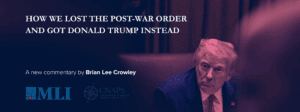By Andrew Erskine, April 23, 2025
As Canadians prepare to go to the polls in the wake of United States President Donald Trump’s threats to make Canada the “51st state,” the topic of national defence has returned as a ballot box question. But increased defence capacity can only be secured by fostering multi-party co-operation to ensure governments can deliver on long-term plans.
The spike of interest in this issue has led many Canadians to express greater support for meeting NATO defence spending targets, and indicate stronger interest in homeland defence, particularly in the Arctic. In response, Canada’s political leaders have vowed to renew investment in the Canadian Armed Forces (CAF), promising new submarines, drones, icebreakers, and more forward-operating bases.
However, any serious plan to deliver on these items will necessitate multi-partisan commitment to a stable policy direction that won’t drastically shift based on the politics of the day or changes in government.
Given the present security crisis, Canadians require more than just catchy campaigns and underdeveloped promises. We need enduring political will to oversee the modernization of CAF combat abilities. This election shows Canadians want serious defence planning and a united vision.
As such, Canadians deserve multi-partisanship in allocating significant resources and valuable time to build up our force capacity. This won’t be simple—politicians are incentivized to disagree—but our leaders must rise to this challenge and ensure the safety and security of all Canadians.
That’s why, following this election, parliamentarians from both sides of the aisle must resolve to move forward with cross-party unity on defence planning and investment.
There are several key actions they should take.
As a first priority, they should craft a defence industrial base strategy (DIBS), outlining how the nation’s public and private sectors can work together to build up our industrial capacity. This should involve the ability to conduct research and development of cyber, digital, and software-defined capabilities. This would create a competitive domestic market for investments, while delivering Canadian solutions to complex technological operating problems.
To be successful, a Canadian DIBS needs a united vision. That’s where the multipartisan approach is vital. The strategy must direct and manage the capacity for critical supply chain items to be manufactured in Canada without caving to partisan gimmicks of giving defence contracts to key ridings or provinces.
Instead, we need high-levels of cross-party unity to ensure a DIBS can flourish. An effective strategy should focus on identifying skilled labour forces that have capacity to assemble, maintain, and sustain large volume outputs of equipment, platforms, and assets—while also paying some attention to the location of processing plants that feed critical materials needed for construction. Not only will this elevate efficiency and cost-effectiveness, it can also make our defence industries quicker and more agile when it comes to capability-sharing.
As a second priority, Canada must avoid hyper-politicizing the procurement process for weapons, platforms, and capital—like aircraft, drones, ships, and integrated missile systems—which has been used in past elections to land partisan attacks on the topics of fiscal restraint or government incompetence in defence planning.
The 1993 election saw the cancellation of the EH-101 helicopter contract by an incoming Chrétien government which had campaigned on such action, only for his successor, Paul Martin, to invest in the Sikorsky CH-148 Cyclone project—a change which resulted in major delays and overspending. Following the 2006 election, Stephen Harper’s Conservatives canceled and then restarted the Joint Support Ship project—originally ordered by the Martin Liberals. The Harper government made the move because of perceived procurement problems, resulting in delays in its delivery.
Famously, the 2015 election saw then-Liberal leader Justin Trudeau campaign on the disastrous promise to not purchase the F-35 aircraft. As prime minister, Trudeau re-opened the search for a new fighter jet, but years later went on to renege on his promise by selecting the F-35s—and thereby deepening the CAF’s commitment-capability gap in the air domain.
This series of reversals shows why cross-party vision is necessary if Canada is to successfully acquire key capabilities and assemble them over the long-term. Specifically, this requires a shared commitment that would prohibit changes or cancellations in the procurement processes unless there were evidence that deliverables would be ineffective in achieving specific requirements, or inefficient due to technological advancements.
Shifting away from the quick pace of partisan politics can assure our defence industry and commercial partners that Canada can be trusted. It will allow Ottawa to demonstrate consistency in prioritizing the procurement of sufficient quality and quantities of equipment, platforms, and weapons based on strategic and industrial capability requirements.
The same can be said about the short-term procurement of crucial weapons, platforms, and supplies. These items are required to immediately curb Canada’s overarching commitment-capability gap which hinders CAF readiness, lethality, and operationality in the sea, air, and land domains. However, for Ottawa to initiate a short-term policy it will need to pursue a procurement strategy of buying off-the-shelf items from like-minded partners. That’s a touchy subject which often sees federal and provincial politicians express discontent about spending outside of Canada and not investing in our defence industries.
The emphasis on a “made-in-Canada” military is unfortunately unattainable at present. We do not have a vibrant or modern defence industry to provide the required sea, air, and land assets immediately needed to support the CAF’s operations at home or abroad. Instead, a July 2024 decision to purchase new submarines through foreign suppliers exemplifies the type of interim procurement policy that can curb Canada’s commitment-capability gap in crucial areas until our domestic production capacity increases. This approach will facilitate essential improvements to the CAF’s lethality, mobility, and survivability.
Identifying allies that possess the industrial infrastructure and military know-how to meet CAF procurement needs should be part of a cross-party vision to allow Ottawa to better manage planning and acquisition. This will be essential to obtaining critically needed weapons, platforms, and capabilities for specific military goals that are immediately vital to our national defence interests at home and abroad.
Canadians are signaling a desire for more serious defence planning and investments. It’s time our political leaders take note of a more hostile geopolitical order.
That means realizing Canada risks losing on a future battlefield if our political parties do not take co-operative action today—in a moment when they have the time, resources, and public support to advance a shared vision for investing in our defence capabilities.
Andrew Erskine is a 2025 emerging leader with Arctic Frontiers, a 2025 young leader with Pacific Forum, and a contributor for the Macdonald-Laurier Institute.
The author of this piece has worked independently and is solely responsible for the views presented here. The opinions are not necessarily those of the Macdonald-Laurier Institute, its directors or supporters. The Macdonald-Laurier Institute is non-partisan and neither endorses nor supports candidates or political parties. We encourage our senior fellows to comment on public policy issues, including during election campaigns, but the publication of such expert commentary should not be confused with the institute taking a position for or against any party or candidate.








